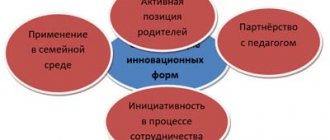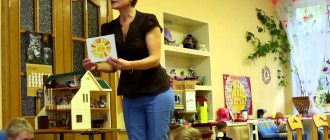Task 6 “Piggy Bank of Wise Thoughts”
Next task: solving pedagogical situations. I offer you a conflict situation, and you must find a way out of it. Teachers are asked to determine their attitude to the behavior of parents, distribute the text on cards and role-play the teacher-parent situation.
- a mother complains to the teacher that her child comes home from kindergarten bitten;
- parents bring an obviously undertreated child to kindergarten without a medical certificate and demand that you accept the child, because they simply have nowhere to take the child. You need to politely and tactfully explain to the parents that you cannot accept such a child;
- a mother complains to the teacher that her child comes home from a walk in dirty clothes;
- Mom comes to the teacher for advice: we have a second child in our family. How to help an older child adapt to the arrival of a baby?
- The teacher, talking about the role of physical activity in the physical development of preschoolers, advises parents to buy their children lightweight sportswear for physical education, and in response hears an indignant exclamation: “Well, here’s another thing, my child will wear a warm suit! I know better what to dress him in!”
- Marina attends a speech therapy group. The girl’s speech requires regular completion of individual tasks. However, Marina does not fulfill them, explaining this by the fact that her mother goes to shaping sessions and does not have time to work with her.
- Tanya’s mother comes to the manager with tears in her eyes: “This is outrageous! The child has a bruise again. Why do teachers get paid?” After admonitions from the head of the kindergarten, having calmed down somewhat, he declares: “Take action, otherwise I will complain to higher authorities!”
- Sasha is withdrawn, passive in class, and often shows aggression towards his peers. Sociometric examinations showed that the child belongs to the category of outcasts, and the teacher advised the mother to consult a psychologist about this. Mom reacts violently, proving that her son has many friends, talking about his favorite activities at home.
Having summarized the teachers’ statements,
the senior educator talks about the negative aspects encountered in the work of educators.
On the part of teachers today, there is also a not entirely correct position: ignoring the opinion of parents, ignorance of the conditions of family upbringing, extolling their own successes and merits, labeling (“An apple from an apple tree...”, “Such parents have such a child, no wonder!”) - everything this allows us to talk about different types of behavior of educators.
Task 4 “Treasury of pedagogical ideas”
And now I suggest you complete the following tasks. What forms of work do we use to work with parents?
Teams are invited to name as many traditional and non-traditional forms of holding parent meetings as possible (gatherings, open microphone, round table, master class, family kaleidoscope, question and answer evening, family club meetings, group housewarming, candlelight evening, meetings with specialists, oral magazine, conferences, etc.)
Table No. 2
Traditional forms of working with parents
Non-traditional forms of working with parents
- Parent meetings
- Conversations
- Consultations
- Questioning
- Workshops
- Seminars
- Visual information
- Exhibitions
- Competitions
- Round table
- Evening of questions and answers on the topic
- Family Theater
- Parent mail
- Family living room
- Family Club
- Helpline
- Family library
- Hiking
- Videos
- Advertising information
- Newspaper, magazine
- Presentations
Why, given the variety of forms of work and a clear understanding of the functions of the family and kindergarten, does misunderstanding arise between teachers and parents?
Task 5 “Ring of Erudites”
I suggest you answer the following questions.
Teachers are divided into 2 teams, each team is asked to answer questions. The team that gives the most correct answers wins.
1. The main regulatory document from which this phrase is taken: “... a preschooler is not a relay race that the family passes into the hands of kindergarten teachers. What is important here is not the principle of parallelism, but the principle of interpenetration of two social institutions... The trend aimed at strengthening the family minimizes public education in favor of family education.” (From the Concept of Preschool Education).
2. From which regulatory document is this phrase taken: “Parents are the child’s first teachers. They are obliged to lay the foundations for the physical, moral and intellectual development of the child’s personality in infancy.”
(RF Law on Education)
3. What are the methods for studying the family? ( questioning, testing, conversation, patronage, observation of the child’s play activities, “Parental essay”, diagnostic drawing methods, etc.)
4. …… is a historically established system of relationships between spouses, parents and children. Its members are connected by family or marriage ties, a common life, and mutual responsibility. (Family)
5. Choose the most complete answer. Family education is...
– raising children in a family environment; – more or less conscious efforts to raise a child; – a controlled system of relationships and interactions between parents and children, aimed at achieving the desired results;
– a means of family education;
– a form of general educational training for parents.
6. What is the role of other social institutions in raising children? (help, support, guide, supplement the educational activities of the family).
7. What is the teacher’s competence in communicating with parents? (improves his knowledge, strives for active interaction, is attentive, self-possessed, tactful in communication, has knowledge about the family, takes into account the social needs of parents, knows how to plan work with parents, has communication skills).
8. In what areas of knowledge should a teacher be competent to fully communicate with parents? (medicine, pediatrics, physiology, psychology, pedagogy, rhetoric, etc.)


